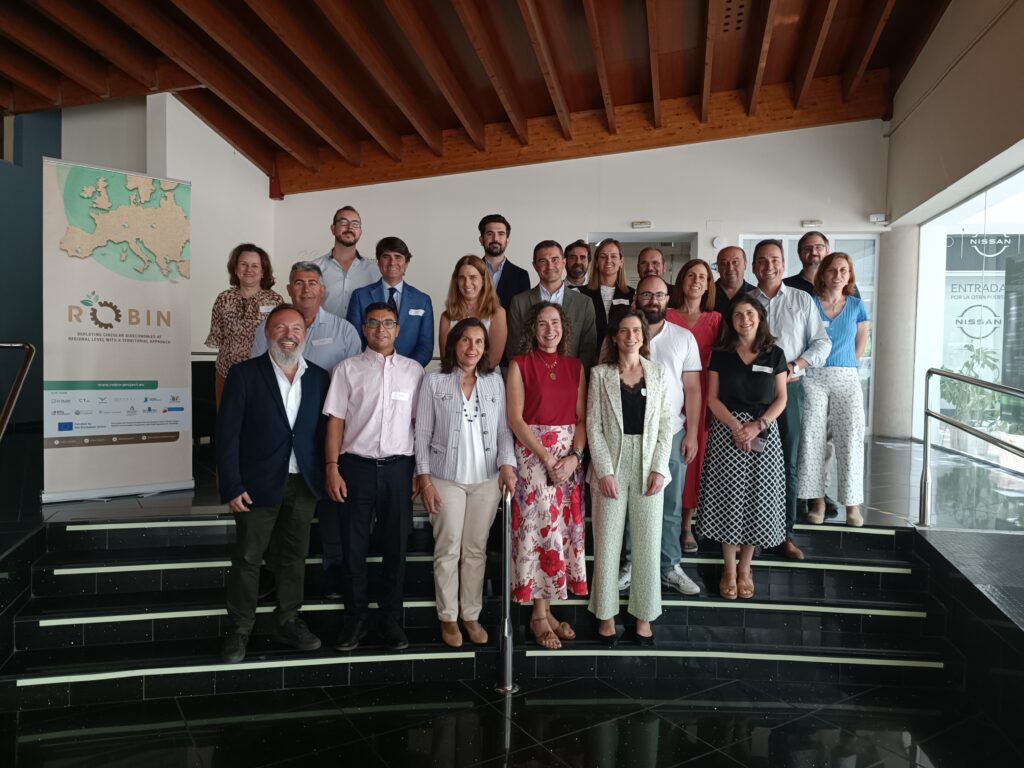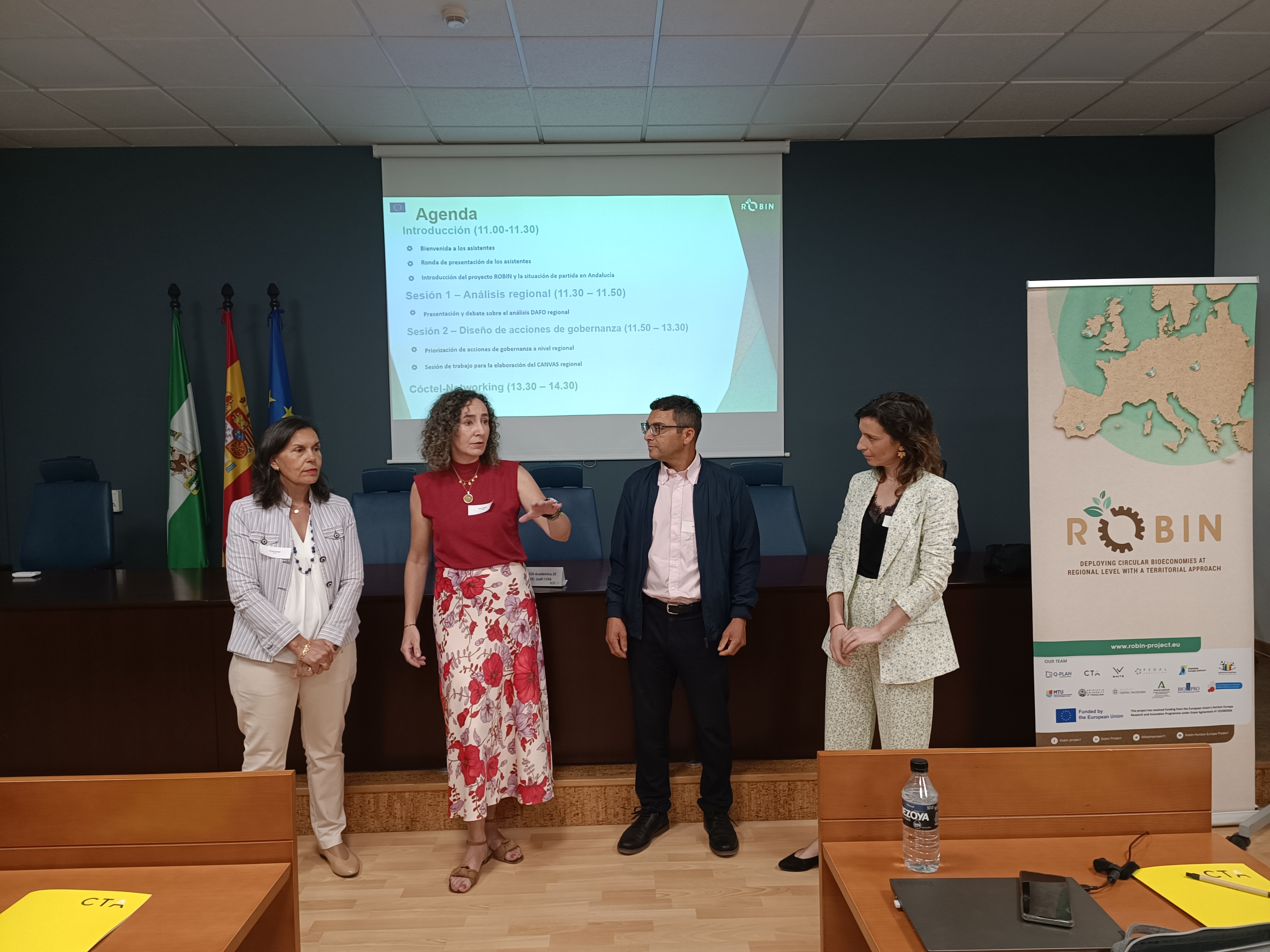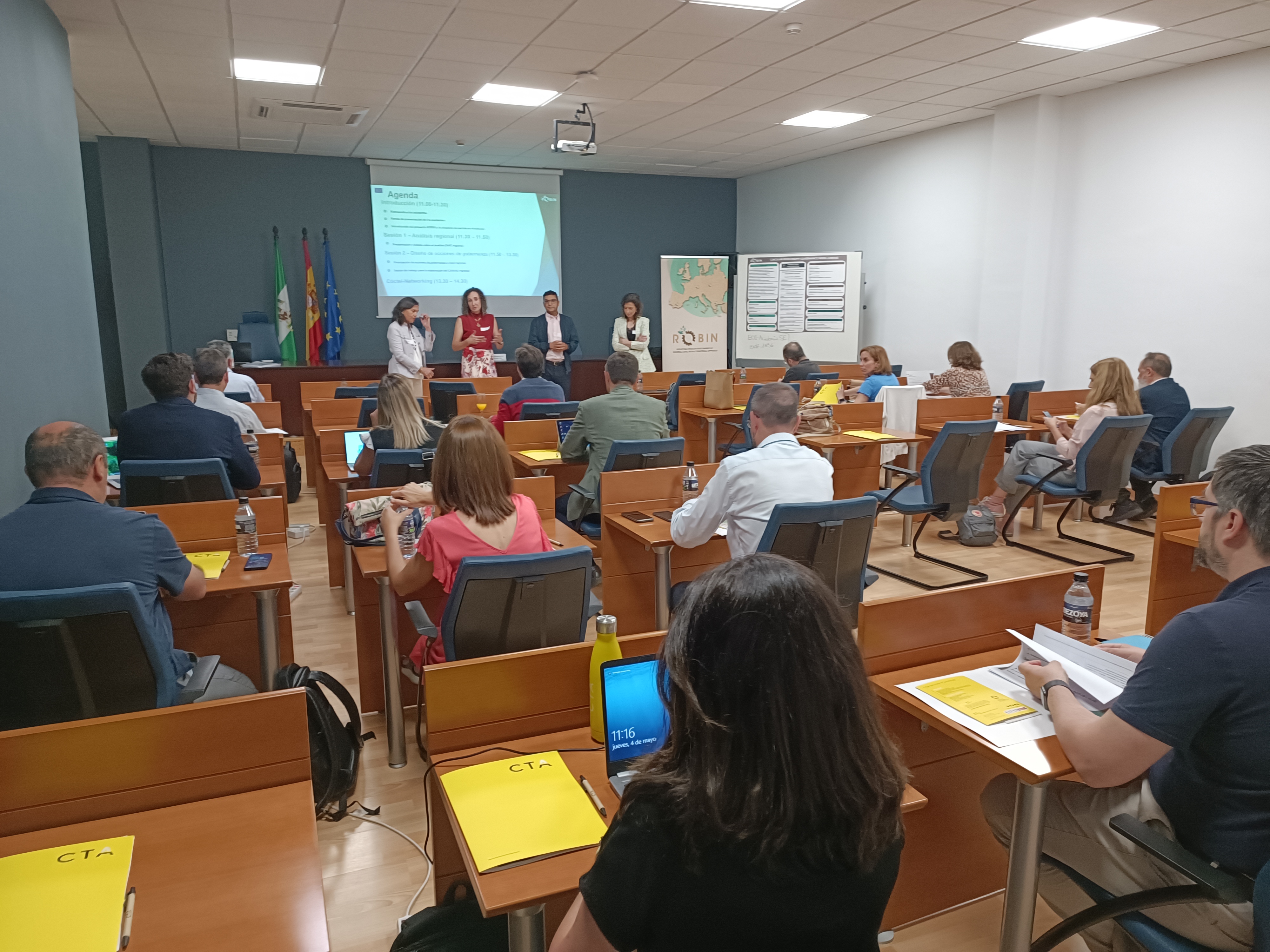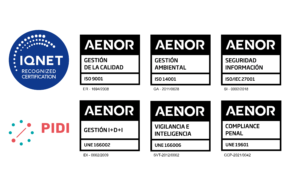
Almost 30 Andalusian experts have met today in Seville in a Co-Creation Workshop organized, within the framework of the European project ROBIN, by the Consejería de Agricultura, Pesca, Agua y Desarrolllo Rural (Ministry of Agriculture, Fisheries, Water and Rural Development – CAPADR) of the Junta de Andalucía, the Andalusian Institute of Agricultural, Fisheries, Food and Organic Production Research and Training (IFAPA) and CTA (Technological Corporation of Andalusia).
The objective of the meeting, held at the headquarters of the School of Industrial Organization (EOI) in the Cartuja Science and Technology Park (PCT Cartuja) in Seville, was to work together to improve the governance of the Circular Bioeconomy in Andalusia, for which representatives of agri-food and biotechnology companies, consumers, research organizations, universities and public bodies have met.
Specifically, there were representatives from the universities of Almería, Granada and Seville, the Regional Development Institute, the Campus of International Excellence in Agrifood-CeiA3, the Fat Institute (CSIC), Emasesa, Bioazul, Grupo Empresarial La Caña, the San Isidro de Loja Agricultural Cooperative, Ecogestiona, the Andalusian Consumers Union, the Andalusian Council of Colleges of Agricultural Technical Engineers and TRADE.
SWOT, prioritization of actions and canvas for the promotion of the Circular Bioeconomy
Guided by the organizers of the event, the attendees got to know the ROBIN project better, outlined a SWOT analysis of the opportunities and barriers of the Bioeconomy from the starting point in Andalusia, prioritized possible governance actions at the regional level and jointly prepared a Canvas strategic management model for the promotion of the Circular Bioeconomy in Andalusia.
This workshop is one of the activities planned in the ROBIN project and will be held in parallel in a similar way in the other 4 selected European regions in addition to Andalusia: Southern Region (Ireland), Central Macedonia (Greece), Baden-Wuerttemberg (Germany) and Zilina (Slovakia). The objective is to detect good practices to demonstrate the potential of innovative bioeconomy governance models and structures in these five regions, so that it can later be extrapolated to the rest of the European Union.
Fast-tracking the green transition

The European ROBIN project, financed by the Horizon Europe program, aims to promote innovative governance models in Circular Bioeconomy to help regional Administrations to accelerate the green transition.
Led by the Greek partner Q-PLAN, the ROBIN project has the full title “Deploying circular BIOeconomies at the regional level with a territorial approach” and aims to help European regional authorities to use social innovation techniques and shape their governance structures in order to promote the Circular Bioeconomy.
Consejería de Agricultura (Junta de Andalucía) will contribute to improving its regional governance model of Circular Bioeconomy by updating its Andalusian Strategy for Circular Bioeconomy (EABC), incorporating the new challenges and opportunities that arise from this project. Among the actions, the creation of an Andalusian circular bioeconomy node will be promoted that will involve the interested agents of the quadruple helix and that will be in line with the measures proposed in its EABC. In addition, the Ministry will contribute its experience in the development of tools for the design of Bioeconomy strategies.
Likewise, IFAPA will contribute to the project with its experience in the development of innovative practices in different areas of the Bioeconomy, such as those carried out to remanufacture the supply chain to achieve a zero level of inorganic waste and demonstration and information activities for management sustainable management of waste in the agri-food sector.
CTA will lead the cocreation of governance models and the design of regional action plans, working with all the regions involved in the project. In addition, CTA will coordinate the exchange of good practices and lessons learned between the partners, promoting the development of transregional partnerships for the implementation of the bioeconomy.
The Bioeconomy has the potential to contribute substantially to the objectives of the European Green Deal and, at the same time, Europe’s regional authorities have a crucial role to play as agents of inclusive and resilient economic development for their territories. The ROBIN project aims to clarify how Europe’s regional administrations can explore their potential for Bioeconomy governance schemes so that they can contribute to the European Union’s mission for a faster green transition.
Andalusia has a clear commitment to the circular bioeconomy, being one of the first European regions to adopt a circular bioeconomy governance model, specifically the Andalusian Circular Bioeconomy Strategy (EABC). Likewise, the recently published Andalusian Circular Economy Law (LECA) will establish the necessary mechanisms for the implementation of circular economy and bioeconomy policies and regulations. These mechanisms include: promoting the application of circular economy principles in the bioindustry; encourage industrial symbiosis between activities that generate biowaste and those that value it as bioenergy or bioproducts; contribute to the growth and sustainable development of Andalusia, promoting actions aimed at the production of renewable biological resources and processes.
The project will facilitate further stakeholder engagement in the Circular Cities and Regions Initiative (CCRI-CSO), launched by the European Commission as part of the Circular Economy Action Plan and aimed at supporting stakeholders in all cities. and regions of Europe to implement the transition to a circular economy.




